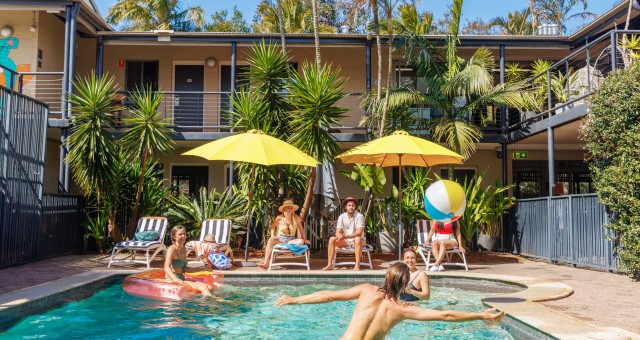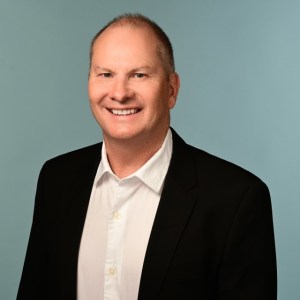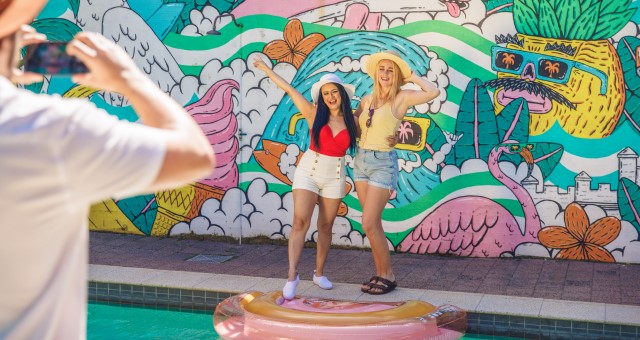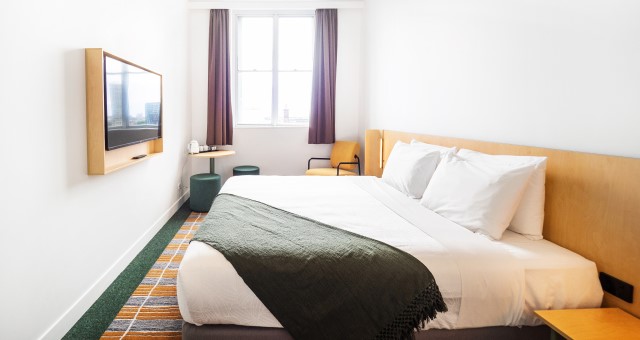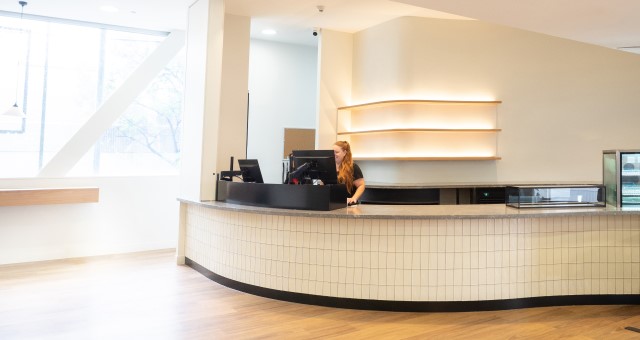Paul McGrath took the reins as CEO of YHA Australia in April 2020, tasked with reinventing the business in the midst of a global pandemic. Three years on, he shares an insight into the major rebrand, refurbishments and revival of travel.
What prompted the rebrand of YHA and the refurbishment of your properties?
We had to sell assets to survive Covid, so we rationalised – we thought about the type of product that we wanted to offer and slowly sold off those assets that didn’t align with that. That provided us with capital to invest back in the business, to give us a bit more flexibility in our financing and give us more time to do the transformation.
We did a lot of customer research. We were in that backpacker space, but the market had evolved. We wanted to provide a broader product portfolio to bring an affordable option to the market. We basically changed everything from the inside out.
We came up with a more contemporary brand and changed our language. We no longer refer to our guests as “backpackers”, they are “curious travellers”, and we no longer run “hostels”, we run “properties”.
We found that hostels had a negative connotation amongst the Australian consumer, which we were relying on, so we realised we need to change the perception of who we are, what we do, and why we do it.
With the rise of the digital nomad and major hotel groups tapping into this growing segment, is it more competitive in this space now?
A lot of hostels went out of business during Covid – particularly smaller family-run businesses. A lot of owners repurposed their properties to get a higher and best value use, so there’s a shortage of that type of accommodation in the market.
What we are seeing is this hybrid type of hotel – with co-living rooms, double and twin rooms, private and nonprivate facilities – market is constricted. And that’s why we’re doing probably better than the average in the market space.
And we knew that would happen. We know that there are overseas operators that are looking to come in so that’s why we were on a very tight timeframe to get ourselves ahead of the game.
How are international traveller numbers now?
Pre-Covid, we were 70% international, 30% domestic. I was always pretty uncomfortable with that because it was relying too much on the international market. We’re now sitting around about 55% international, 45% domestic. I expect by the end of the year we will sit at 60% international, 40% domestic – meaning domestic share growth of 10% – which I think feels a bit more natural to me.
The inbound market has come back in all our traditional markets – Europe, USA, Canada, South America – and we’re seeing unexpected growth in some inbound markets such as South Korea.
What demographic are you targeting now post transformation?
We were mostly 18-25-year-olds pre pandemic, but we were able to broaden that base through our repositioning. Now, a third of the businesses is 18-25 years; a third of the businesses is 25-35; and a third is over 45.
The age range for Working Holiday Visa for the UK has been extended to 35 years, so that is becoming an older demographic for us, and then you’ve got the digital nomads, the grey nomads and school groups.
Technology has been a big focus of the transformation. What have been the biggest changes?
We needed to be more efficient, so we introduced a new property operating system and a new revenue management system to manage and maximise our inventory. Instead of being human led, it’s AI lead so that as demand increases, our rate increases, and we maximise those opportunities.
We are trialling mobile key technology at Sydney Harbour and that’s going really well. It allows guests to pre-check-in online and enter the property and their room using a mobile device. But we want to take this further so that guests can also order F&B through QR codes on the table and where we can engage with guests through messaging and update them when their room is ready. We also want to add other facilities and functions on to that to build loyalty amongst our members.
What are you focusing on in terms of experiences for guests?
We are introducing Indigenous experiences at our properties at least once a week so that international and domestic travellers can engage with the local Aboriginal or Torres Strait Islander culture. It’s really important to us to share their history, how they would like it to be shared.
We also want to give people the opportunity to offset their carbon footprint and travel lightly we are introducing offsetting opportunities where guests can go tree planting or counting wallabies.
Is it important to have an F&B offering at each property and do you see the communal kitchen as an ongoing part of the offer?
Yes, we found that 45% of the guests use the kitchen, but we also want to give people the choice to purchase food if they wish.
At Sydney Harbour, for example, we’ve got a cafe on level one and we’re working hard to provide a broader range product. We are seeking approval for a licence to run a rooftop bar, and we also want to offer pop-up meals two or three nights a week.
What’s on the agenda for YHA over the next 12 to 18 months?
This year, we will do 100 room upgrades across Sydney, Brisbane and Adelaide. We are aiming for all gateway properties to have a breakfast offering and some type of F&B in the evenings as well. By the end of 2024, we want every property to have an Indigenous experience and also an environmental experience, once a week that guests can participate in if they want to.
Tech Central [a partnership with tech giant Atlassian] is due to open in Sydney in November 2026, so we are working hard on designing that and imagining what a property looks like in 2026. We will be using Tech Central as our North Star, so we will be prototyping things that we want to use there in some of our other properties.

